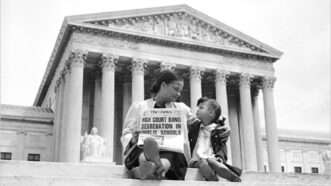Race Discrimination
Why the Economic Impact of Immigration Restrictions is Similar to that of Racial Discrimination and Apartheid
Economist Tarnell Brown explains.
Bill de Blasio's Diversity Push for These Schools Lowered Admissions Standards—and Didn't Increase Diversity
New data display the failures of the expanded Discovery Program.
Trump's Racially Discriminatory Refugee Policy
There is no non-racist justification for prioritizing white Afrikaner South Africans while closing the door to virtually all other groups.
Second Circuit Allows Claim That "Implicit Bias Trainings" Constituted Racial Harassment
The court concluded that the plaintiff, a former New York City educator and administrator, presented enough of a case to go to the jury.
Supreme Court Issues Dubious "Shadow Docket" Ruling Staying Injunction Against Racial Profiling in Immigration Enforcement
There is no majority opinion, so the reasoning is unclear. But Justice Kavanaugh's concurring opinion undercuts principle that government must abjure racial discrimination.
America's Two-Front War on Science
Universities’ internal culture wars threaten free speech and inquiry, but political attacks on research funding and infrastructure are crippling U.S. scientific leadership.
Federal Court Rules Against Racial Profiling in "Roving" Immigration Enforcement Raids
Racial profiling is a longstanding problem, exacerbated by Trump Administration deportation policies.
Colleges Created a Diversity Box-Ticking Game—Zohran Mamdani Just Played It
The big problem here is the elite racism of college admissions departments, not the mayoral candidate's creative box-checking.
I'm No Fan of UVA's President. That Doesn't Mean the Government Should Force Him Out.
Jim Ryan is the latest casualty in Trump's unconstitutional war against elite universities.
Standard for Proving Title VII Violation Same for Majority Plaintiffs as for Minority Plaintiffs
The Court rejected some federal circuits' rules that a majority-group plaintiff must "present[] evidence of 'background circumstances' suggesting that the [defendant] was the rare employer who discriminates against members of a majority group."
Can We End Racism by Ending the Idea of Race Itself?
Author Sheena Michele Mason offers an alternative vision for anti-racism.
Anti-DEI Executive Orders Can Go Forward, for Now, Says Federal Appeals Court
A district judge had "found the provisions likely unconstitutional and issued a nationwide injunction" against them; the Fourth Circuit just stayed that injunction, pending full consideration of the issue on appeal.
The Racist Roots of Gun Control
Measures restricting gun ownership still disproportionately harm black and brown people, says Maj Toure, founder of "Black Guns Matter."
"Not Only Is [the Race Discrimination Plaintiff] a Perpetual Claimant, He Is a Holdup Artist"
A judge sanctions a self-represented litigant who threatened to contact defendant's donors as a means of trying to pressure defendant into settling.
American Journal of Law and Equality Symposium on the 70th Anniversary of Brown v. Board of Education
The symposium includes contributions by many prominent legal scholars. I am among the contributors.
Illinois Scholarship Program Explicitly Excludes White Applicants
The Minority Teachers for Illinois Scholarship Program is blatantly unconstitutional.
Public Defender Disqualified from Case for Race-Related Statement in Plea Bargain Negotiations
A California appellate panel interprets California's Racial Justice Act.
Justice Department Sues To Force South Bend To Hold Police to Lower Standards
The Department of Justice alleges that the South Bend Police Department is violating the Civil Rights Act due to disparate acceptance rates for female and black applicants.
Was the Federal Government's Defense of Race-Based Debt Relief for Farmers and Ranchers "Substantially Justified"?
An interesting question divides a panel of the U.S. Court of Appeals for the Sixth Circuit.
The 70th Anniversary of Brown v. Board of Education
The anniversary is today. The American Journal of Law and Equality is publishing a symposium on Brown to mark the occasion. I am one of the contributors.
Racially Discriminatory Enforcement Lawsuit Against Duluth Police Officer Can Go Forward
A black resident called the police to complain about alleged racial harassment by white neighbor; the resident alleges the police arrested him for leaving the scene after the police arrived, but didn't arrest the neighbor for doing the same thing.
Supreme Court Refuses to Hear Case Involving Use of Race-Neutral Means to Facilitate Anti-Asian Discrimination at Selective Public High School
Justice Alito wrote a strong dissent to denial of certiorari. The issues the case raises are likely to recur. In the meantime, the lower court ruling in the case sets a dangerous precedent.
White University Administrator's Race Discrimination Case Can Go Forward
The administrator, at Texas A & M University Texarkana, alleges he was pushed out because of his race, and because he had declined to discipline a student who "had used the word 'Nigga' in [a classmate's] presence while on a trip to the mall."
ACLU Sues Ronald McDonald House for Refusing To House People Convicted of Assault
The ACLU's lawsuit is filed on behalf of a New York man whose application to stay in a Ronald McDonald House was denied because of his 12-year-old felony assault conviction.
Oklahoma Bill Would Specially Target Hispanic Gang Members
No, you can't do that.
Freedom Towns: A Vast but Largely Forgotten Movement of Black Self-Rule
Zora Neale Hurston’s hometown of Eatonville, Florida, was one of the first all-black municipalities incorporated in the U.S.
Sandra Day O'Connor, RIP
She was the first woman Supreme Court justice, and played a key role in changing the Court's jurisprudence for the better on several issues.
Federal Agencies Neglect Anti-Asian Discrimination in Education
My wife Alison Somin, an attorney with the Pacific Legal Foundation, outlines the problem.
Old gun controls that were constitutionally repealed are not precedents for modern gun control
Amicus brief in Supreme Court's Second Amendment Rahimi case

















